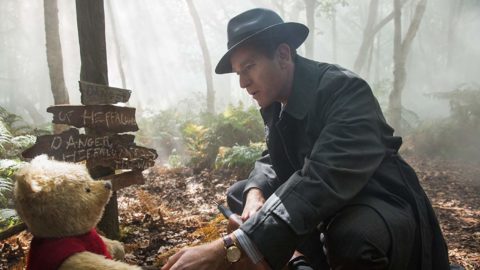Deep Focus: Crazy Rich Asians
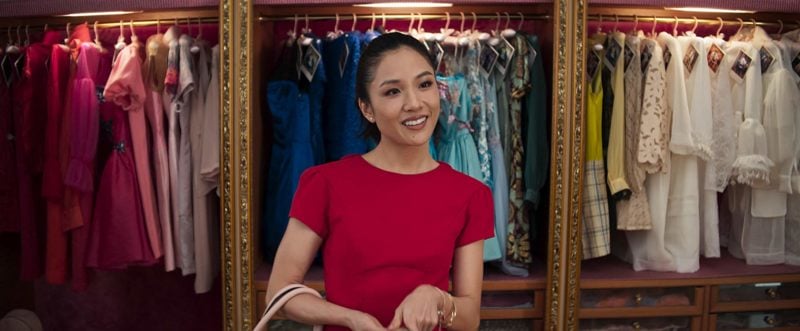
Thoroughly assimilated and confident Chinese-American woman Rachel Chu (Constance Wu) has fallen in love with supremely suave but slightly enigmatic Singaporean man Nick Young (Henry Golding). Nick’s big secret: his family back home belongs to the top 1 percent of the top 1 percent. The broad joke behind the setup: their healthy Greenwich Village romance scandalizes his hoity-toity kith and kin. On her first trip to Singapore (and Asia, for that matter), Rachel, a brilliant economics professor at NYU, gets treated worse than Julia Roberts did in Pretty Woman. Nobody ever put a dead fish in the L.A. streetwalker’s bed.
In the novel, the first time Rachel hears Nick’s name, she asks, “A Brit?” Casting Golding in the role has roused controversy, because this first-time actor is a British-Malaysian model and TV host. But he’s effortlessly persuasive as a Singaporean golden boy.
Crazy Rich Asians requires our willing suspension of disbelief for other reasons—such as its premise. Yet it comes on cool and amusing enough for us to buy that Nick could shield Rachel from the truth about his wealth for many months. Rachel protests that he couldn’t be loaded, or, as he puts it, “comfortable”—after all, he uses her Netflix password. It’s a nifty gag, especially if you know that Netflix made a major bid for Kevin Kwan’s novel and two sequels. (Kwan also serves as executive producer.)
A binge-able series might have been a better way to go, since the script squeezes a sprawling supporting cast into boisterous caricatures and transforms an intricate flow chart of status among Singapore’s superrich into a flood of affectations. I’m not a fan of the book. But I prefer Kwan’s sly, patient catalogue of outré, vulgar, and exquisite customs to the film’s rim-shot burlesques or its awestruck interludes of Lifestyles of the Rich and Famous, Singapore Edition.
The director, Jon M. Chu (Step Up 2, Step Up 3D, G.I. Joe: Retaliation) smartly retains the novel’s period introduction. In 1995, the racist manager of an august London hotel disrespects Nick’s mother Eleanor (Michelle Yeoh), ignores her confirmed reservation, and recommends that she and her group seek a suite in Chinatown. Quietly, and quickly, she outflanks him and re-enters in triumph. For Asian billionaires, living large is the best revenge.
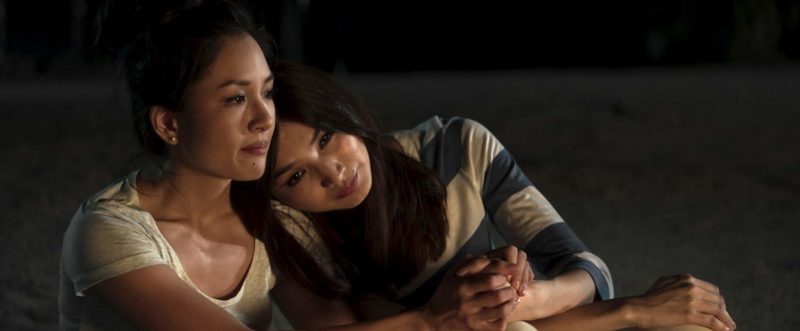
With that idea safely noted, the rest of the film simply revels in the instant power at the Singapore nabobs’ fingertips. In the cleverest sequence, Nick and Rachel share dessert at a New York café while he begs her to attend his closest friend’s Singapore wedding. A svelte observer recognizes Nick, snaps a picture, and relays the news across the globe via her Asian in-crowd (or, as Nick puts it, “RadioOneAsian”). The frame fractures into an ultra-hyperactive version of the split-screen telephone scenes from Bye Bye Birdie and Pillow Talk. Magnified text messages, search results, and profile pictures fill every inch of the wide 2.39:1 aspect ratio. By the time Rachel agrees to go, Eleanor calls Nick from Singapore to verify the breaking news.
I wish Chu had conceived the entire film this playfully, the way Norman Jewison did The Thomas Crown Affair, another film that lets us glimpse the affluent life. To pull it off, Chu and his screenwriters, Peter Chiarelli and Adele Lim, might have had to stylize the straight-arrow love story that made the 2013 book a best-selling “beach read.” The way it is, the film’s most daring humor comes from dropping its lovebirds into hedonistic gilded cages.
Can we retire the use of Wagner’s “Ride of the Valkyries” for helicopter music? It has worn out its welcome as a smart-alecky way to reference Apocalypse Now, and here it blares out while choppers fly the groomsmen to a bachelor party staged on a cargo ship. Hidden by walls of containers, the men cavort with bikini-clad Miss World contestants—all Caucasian. Meanwhile, the bachelorettes carry on as if they’re cramming a Bravo Housewives getaway weekend into 24 hours. They jet to a Sumatran resort complete with spa treatments, free shopping sprees, and multiple opportunities to play Mean Girls at poor Rachel’s expense. The comedy (and in Rachel’s case, the drama, too) feels forced and sour. Happily, there’s some genuine gaiety in the big-hearted, nouveau riche household of Rachel’s college pal, Peik Lin Goh (Awkwafina). The Gohs’ home glitters with gold and its reflections, but their low-comic exuberance is infectious. They’ve patterned their décor on Versailles’ Hall of Mirrors and Donald Trump’s bathroom. Elsewhere, the excess starts at “wretched” and never quite makes it to funny.
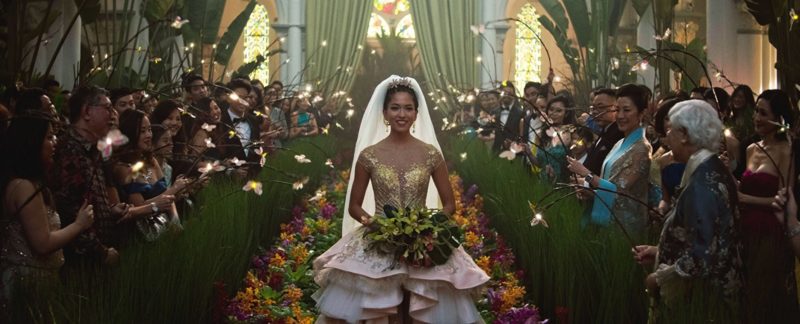
The director often seems as glamour-obsessed as his characters. (The anti-climactic wedding scene, staged with physical effects like water coating the aisle to mirror shimmering lights, amounts to high-gloss kitsch, down to best man Nick and Rachel mouthing a heartfelt “I love you.”) Once they board the plane from New York to Singapore, all we can do is look agog at the features of Rachel and Nick’s first-class sleeping cabin and the upscale wonders to come. Nick’s pal Colin (Chris Pang) and his fiancée Araminta (Sonoya Mizuno) graciously pick up the couple at the airport and join them in scarfing down the viands of Singapore’s renowned street hawkers. Rachel couldn’t, then, be more stunned when Nick’s mom starts cold and grows antagonistic, or when Araminta’s friends accuse her of being a gold-digger, or when Mandy (Jing Lusi), Nick’s malicious ex, informs her that she was Eleanor’s pick for her son’s bride. They rationalize that Rachel is too déclassé and too American. Raised by a single working mother, Rachel doesn’t know her own back story, and she believes in following her professional passion—which the Singaporeans think precludes her from devotion to “family.”
We’re geared for Rachel to summon her you-go-girl spirit and take on Nick’s mother and wily old grandmother (Lisa Lu). For all their pompous, snooty talk, they appear to be expelling her reflexively. The film takes too long to clarify why Rachel should care about these self-important people or try to preserve Nick’s links to them. Her responses to their luxury are passive, ambiguous, or dazzled. But Wu rises to this complex acting challenge. She uses her own emotional transparency to reveal Rachel’s confusion, then insight. She communicates, way before the script does, that Rachel wants to win Nick without severing him from his insular family and its opulence, because they are part of what makes him who he is. Without much writing help until her final showdown with Yeoh’s Eleanor, Wu demonstrates how intensely Rachel gropes toward understanding this forbidding elite. All the while she steels herself to fight it for her man.
At least one actor every episode punctures the Old School “class” or the new-style glitz with skeptical intelligence or anarchic energy. When Rachel and Peik Lin first ooh and aah over the Youngs’ palatial estate, I thought they must be reacting to its size, because there isn’t anything glorious about the Asian-colonial style. On the outside it’s a house of seven or eight gables, with each gable topping its own wing. Inside, it resembles a museum containing objects they can touch, including an enormous stuffed tiger. Luckily, even here, Awkwafina’s Peik Lin imbues her screen time with live-wire attitude. Awkwafina turns Peik Lin grabbing selfies on the Youngs’ grand staircase into an uproarious little dance. The jagged, springy rhythms in her voice and her walk animate the conventional material. Her father (Ken Jeong) says her blonde pixie hairdo makes her look like “Asian Ellen,” but her farcical instincts are more ferocious than DeGeneres’s. She finds an apt buddy in Oliver (Nico Santos), the gay wit of the Youngs’ extended clan. He stays in Eleanor’s good favor as a problem-solver, whether by finding just the right ceremonial gong or by neutralizing a troublesome guest. Santos boasts an apt Wildean flair: he articulates outrageous perceptions with his sparkling conversation. He describes himself as the Youngs’ “poor relation rainbow sheep.”
Golding, an impressive first-time actor, and Wu, the star of ABC’s Fresh Off the Boat, do make a charming couple. Golding has physical grace, candid expressions, and an engaging gentleness. From certain angles he resembles that debonair master James Mason. Wu, always genuine and sympathetic, can also be immensely touching: she instinctively hugs Eleanor at their first meeting. Neither Golding nor Wu suggests hidden mysteries or fire—one reason it’s hard to believe that Golding’s Nick could keep his nuclear family life a secret for over a year.
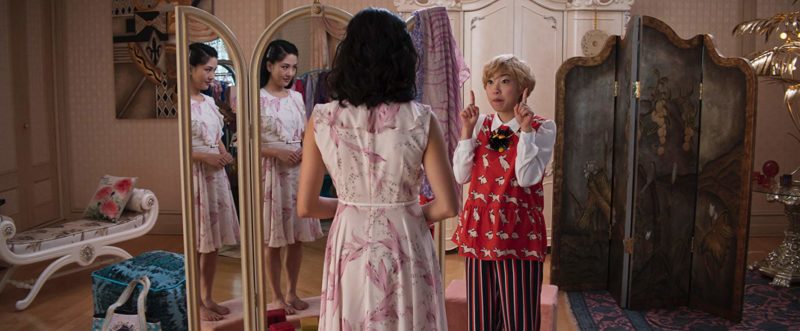
In different ways, Yeoh and Gemma Chan (as Nick’s closest cousin, Astrid), transcend familiar domestic melodrama because of their power to surprise. Few can top Yeoh for still waters running deep. We don’t want to believe that someone of her gravity would be so bigoted toward “ABCs” (American-born Chinese) and so cruel to Rachel, who immigrated with her mother when she was six months old. Yeoh subtly expresses the underlying tensions beneath Eleanor’s blanket statements of principle—a triumph of understatement in a hyperbolic movie. As Astrid, considered the perfect woman in her set, Chan doesn’t over-rely on elegance. Her luminous beauty vibrates with thought and feeling. She conveys the importance Astrid places on remaining composed: for her it’s an aesthetic choice, not just learned behavior. She won’t violate her personal style by screaming at her husband over his infidelity.
Media coverage of the film has focused on how significant it is for all audiences, especially Asian-Americans, to see an all-Asian ensemble in a big-studio release. (The precedents include 1993’s The Joy Luck Club, 2004’s Memoirs of a Geisha, 2006’s Letters from Iwo Jima, and my favorite in this list, Justin Lin’s sizzling 2002 teen-rebel movie, Better Luck Tomorrow.) Several actors here do get a chance to prove their talents in a film that immerses us in a rarefied, exotic milieu.
What gives the movie its erratic vitality, though, is its mix of Asian and European mores and culture, jet-set flash, and American Pop, which evokes the particular ambiance of Singapore’s high-society subculture. The score emphasizes eclectic, cosmopolitan vibes. The Elvis hit “Can’t Help Falling In Love” (itself loosely based on a classical French romance) becomes Colin and Araminta’s wedding song. Berry Gordy’s “Money (That’s What I Want)” emerges as the movie’s theme song. The strictly instrumental music ripples with American swing and Big Band flourishes.
In Kwan’s novel, Rachel decides that Nick is her true love when he knows the words to the Talking Heads’ “This Must Be the Place (Naïve Melody).” The Talking Heads’ sweetest lyrics celebrate, “You’re standing here beside me / I love the passing of time/Never for money, always for love.” Too bad this number didn’t make it into Chu’s Crazy Rich Asians. It would have infused this literal, glittery film with some downtown lyricism and irony.
Michael Sragow is a contributing editor to Film Comment and writes its Deep Focus column. He is a member of the National Society of Film Critics and the Los Angeles Film Critics Association, and a contributor to the Criterion Collection.



